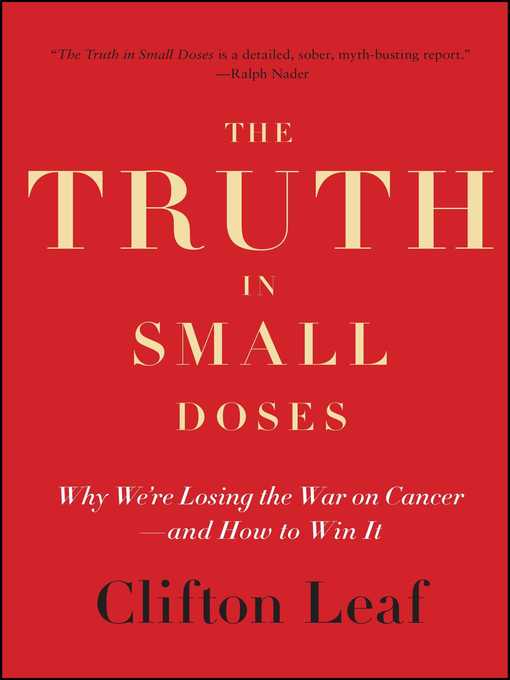
The Truth in Small Doses
Why We're Losing the War on Cancer - and How to Win It
چرا ما در حال از دست دادن جنگ بر سر سرطان و چگونگی برنده شدن آن هستیم؟
کتاب های مرتبط
- اطلاعات
- نقد و بررسی
- دیدگاه کاربران
نقد و بررسی

July 8, 2013
Former Fortune editor Leaf dissects years of cancer death rates to reveal the reality of the fight against cancer; in over 40 years, and despite $16 billion per year spent on drug development and other research, there has been little change in individual cancer death rates. Rather than pursuing preemption, which was understood as the answer even in the early 1970s, "ur current system is designed not to solve problems, but to produce studies." Researchers face many difficulties, from obtaining funding or tissue samples to low enrollment for clinical trials. As an observer and a cancer survivor, Leaf proposes that scientists be freed from the stifling research culture by aligning funding with improved goals, simplifying management, and consolidating laboratory capabilities and efforts. Through flowing prose Leaf delivers, alongside facts and data, stories on personalities involved in research, the fascinating process of solving an unusual and highly deadly cancer in Africa, and the heartbreaking realities of cancer treatment in children today. Leaf's extensively investigated treatise will resonate with researchers and patients frustrated by the bureaucratic woes he delineates. Public policy makers, grant reviewers, and pharmaceutical researchers alike must consider Leaf's indictment and proposed solutions.

July 1, 2013
For this eye-opening look at why the U.S. is losing the war against cancer, Leaf, the former executive editor of Fortune, interviewed more than 1,000 people over nine years. The statistics are depressing: in 2013, 580,000 Americans will die of cancer, the nation's number-two killer for the past 75 years. And more than 1.6 million will be diagnosed. Of course, many survive. Leaf himself was diagnosed with Hodgkin's disease at age 15. Leaf blames the failure to cure cancer on mismanagement. No one is coordinating individual research efforts or generating get-a-man-on-the-moon urgency. Leaf would like to see more focus on preemption; today only 7 percent of the National Cancer Institute budget goes to prevention. He would also like the government to fund people rather than projects, to focus less on publishing studies and more on solving problems, and to avoid awarding money to the same institutions. Siddhartha Mukherjee's Pulitzer Prizewinning The Emperor of All Maladies (2010) got Americans talking about the stalled battle against cancer. Leaf's book keeps the conversation on track.(Reprinted with permission of Booklist, copyright 2013, American Library Association.)

























دیدگاه کاربران